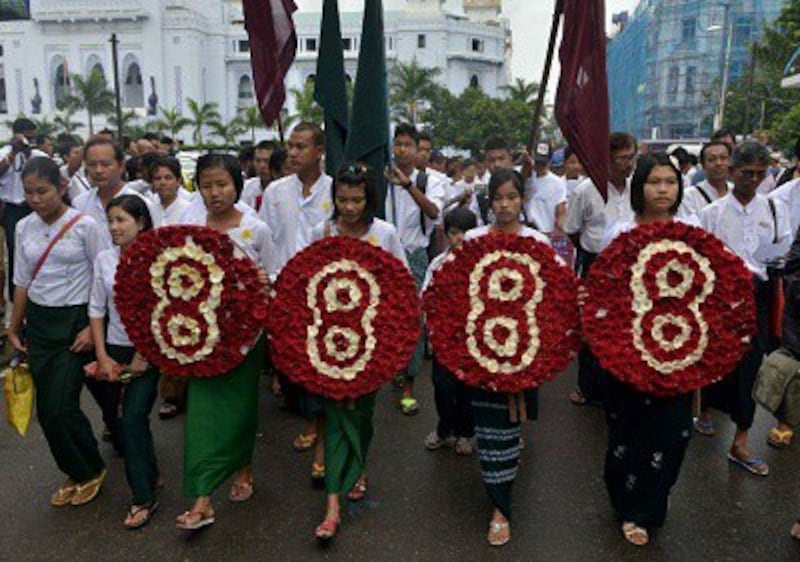Myanmar’s opposition leader Aung San Suu Kyi called Thursday for sustained unity and a faster pace for democratic reforms in the country as thousands gathered in the former capital Yangon for the historic commemoration of a brutal 1988 military crackdown on pro-democracy demonstrators.
Some five thousand people including activists, former political prisoners, Buddhist monks, foreign diplomats, and opposition and ruling party lawmakers attended the ceremony, the largest public commemoration yet for the Aug. 8, 1988 crackdown which left thousands dead.
It was part of a three-day Silver Jubilee memorial for the 25th anniversary of the crackdown and was attended by many student leaders who led the uprising as well as current government leaders who were from the previous military junta which suppressed the revolt.
Nobel laureate Aung San Suu Kyi, who rose to prominence in the 1988 movement and now heads the opposition National League for Democracy party, called on the country to “move forward” with democratic reforms.
“It is a good sign for our country that we are all working together on the ’88 anniversary, but it is not enough to be united for one, two, or three days,” she told the audience at the Myanmar Convention Center.
“We have to keep building this unity.”
“We should not have antipathies and should work on healing the wounds that our country has been suffering from,” she said.
She praised the then-student activists who spearheaded the movement and thanked those who had “sacrificed their lives.”

Monks were offered food in a ritual dedicated to those who died in the movement, and activists marched through the city in honor of the some 3,000 who died in the crackdown.
Rights groups have said the generals responsible for the crackdown still need to be held accountable and have urged President Thein Sein to set up a full probe.
Until a nominally civilian government came to power two years ago with Thein Sein at the helm, public commemorations of the ceremony were barred.
Thein Sein, who took over after five decades of military rule, has embarked on a reform drive, but demands for further changes, including amendments to the constitution and a reduced role for the military, are increasing.
Many of those who were imprisoned in the crackdown and a large number of other political prisoners have now been released.
Htay Oo and Thein Zaw, lawmakers from the ruling military-backed Union Solidarity and Development Party—the successor organization to the party that was in power at the time of the crackdown—attended the ceremony, while others sent messages to the jubilee.
'Before, we could only whisper at night'
Min Ko Naing, leader of the 1988 student movement and now of the 88 Generation Students civil society organization that grew out of the protests, said in his speech at the ceremony that he was grateful Myanmar can now talk about the uprising more openly.
“Before, we could only whisperer at night about the history of the 1988 uprising, and now this history can be talked about loudly,” he said.
He said he prays that the era of “shedding tears and losing lives” is now over, and that the country will be able to rebuild itself with inclusiveness for all ethnic groups, without discrimination and without unfair opportunities for the privileged.
Some activists have called for a full apology for the event and for the anniversary to be recognized as “Democracy Day.”
In the crackdown, troops fired on peaceful protesters after a nationwide strike involving thousands of students, Buddhist monks, civil servants, and ordinary citizens led to simultaneous protests in cities and towns across Myanmar.
Protesters fought back with makeshift weapons in what became known as the "88 Uprising," and daily calls for a transition to democracy and an end to military rule continued through September.
March for fallen heroes
On Thursday morning, former political prisoners staged a march through the streets of Yangon, which had been the scene of bloody street battles in the crackdown.
“I am marching today to honor the heroes who died in the 1988 uprising,” activist and former political prisoner Phyu Phyu said.
“We want to honor heroes who gave their lives in the democracy revolution and to let the new generation know about them,” another participant said.
At one point, police blocked the marchers because they did not have a permit.
But they were eventually allowed to continue, making their way to City Hall in the city center.
Family members of people who died in the crackdown paid tribute by laying wreaths in Yangon’s Maharbandula Park.
Some activists who had fled into exile returned to the country for this week’s memorials, which also included an exhibit of once-banned photos and video from the movement as well as events in other cities.
Former student leader Moethee Zun, who lives in exile in the United States and returned to Myanmar for the anniversary, said the occasion was an important time for activists to gather to discuss Myanmar’s future.
“We are discussing the ways to address the country’s challenges. Having a chance to hold this event is a huge opportunity for us,” he said.
Reported by Zin Mar Win, Yadanar Oo, and Kyaw Lwin Oo for RFA’s Myanmar Service. Translated by Khet Mar. Written in English by Rachel Vandenbrink.
